|
|
|
Sort Order |
|
|
|
Items / Page
|
|
|
|
|
|
|
| Srl | Item |
| 1 |
ID:
095206
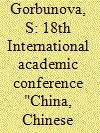

|
|
|
|
|
| Publication |
2010.
|
| Summary/Abstract |
The 18th International Academic Conference "China, Chinese Civilization and the World: History, the Present, Prospects" was held in Moscow at the RAS Presidium and the Institute for Far Eastern Studies. It was timed to two major historical events: the 60th anniversary of the formation of the PRC and the 60th anniversary of the establishment of diplomatic relations between the U.S.S.R./RF and the PRC.
|
|
|
|
|
|
|
|
|
|
|
|
|
|
|
|
| 2 |
ID:
172615
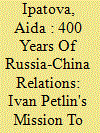

|
|
|
|
|
| Summary/Abstract |
May 2019 marked 400 years of relations between Russia and China, two major powers belonging to different world civilizations. It was a long way from knowing or understanding absolutely nothing about each other, through conflicts, including armed clashes, to realizing that a peaceful dialogue based on mutual understanding and reciprocal concessions was the right choice. The first step in this direction was taken by Russia as it sent, in 1618-1619, Ivan Petlin's mission to China where it was welcomed at the diplomatic level.
|
|
|
|
|
|
|
|
|
|
|
|
|
|
|
|
| 3 |
ID:
093731
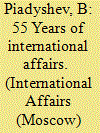

|
|
|
|
|
| Publication |
2009.
|
| Summary/Abstract |
MEZHDUNARODNAIA ZHIZN', a foreign policy journal, was started in Moscow in 1954 by the popular and influential Znanie (Knowledge) educational society if we trust the imprint. In fact, it was a periodical of the Foreign Ministry of the U.S.S.R.; today, 55 years later, it remains a publication of the Foreign Ministry of the Russian Federation. The Znanie Society disappeared together with the Soviet Union; today, there is no need to camouflage the editors' close creative and other ties with the Foreign Ministry. In short, I am going to write about the 55th anniversary of the journal.
|
|
|
|
|
|
|
|
|
|
|
|
|
|
|
|
| 4 |
ID:
115794
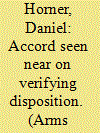

|
|
|
| 5 |
ID:
162700
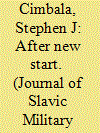

|
|
|
|
|
| Summary/Abstract |
The United States has planned an ambitious strategic nuclear modernization program, as has Russia. Within this context, what are the expectations for New START and its extension to 2026 or beyond? This study analyzes possible scenarios for US strategic nuclear modernization within New START limitations, acknowledging that wild cards include the fate of the INF treaty, threats posed by missile defenses and postmodern counter-defense weapons, and other uncertainties.
|
|
|
|
|
|
|
|
|
|
|
|
|
|
|
|
| 6 |
ID:
095514


|
|
|
| 7 |
ID:
091402
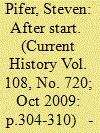

|
|
|
|
|
| Publication |
2009.
|
| Summary/Abstract |
The Obama administration regards a post-START treaty as the first step in a continuing process of nuclear arms reductions. But this will prove the last 'easy' nuclear arms control agreement between Washington and Moscow.
|
|
|
|
|
|
|
|
|
|
|
|
|
|
|
|
| 8 |
ID:
111183
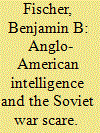

|
|
|
|
|
| Publication |
2012.
|
| Summary/Abstract |
During the Soviet war scare of the 1980s, British intelligence shared vital information from KGB officer Oleg Gordievsky with its American partners. The US intelligence community, however, was suspicious of the message and the messenger, dismissing Soviet 'war talk' as disinformation. Some officials even believed that the British had tweaked their reports to influence US policy. President Ronald Reagan, however, on the advice of Prime Minister Margaret Thatcher, listened to Gordievsky rather than his intelligence advisors. The war scare had a profound influence on Reagan's thinking about nuclear war, Kremlin fears, and Soviet-American relations that led him to seek a new détente with Moscow and the end of the Cold War through diplomacy rather than confrontation. Subsequent events and post-Cold War revelations vindicated Gordievsky. Reagan sought his advice on the eve of his first summit meeting with Mikhail Gorbachev and later expressed his gratitude during a private meeting in the Oval Office.
|
|
|
|
|
|
|
|
|
|
|
|
|
|
|
|
| 9 |
ID:
095911
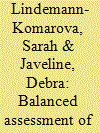

|
|
|
|
|
| Publication |
2010.
|
| Summary/Abstract |
Most analyses of civil society development in contemporary Russia tend to focus geographically on the city of Moscow and substantively on political elites, elections, and human rights violations. To the extent that the 141 million Russian citizens are mentioned, their experiences are usually represented by a handful of Muscovite human rights leaders. These leaders are certainly part of Russia's civil society, as are the many Russian citizens who have been victimized by the brutal war in Chechnya and other actions in the Caucasus. However, what of the other Russians? The story of the remaining 141 million matters and is yet untold.
|
|
|
|
|
|
|
|
|
|
|
|
|
|
|
|
| 10 |
ID:
114455
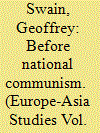

|
|
|
|
|
| Publication |
2012.
|
| Summary/Abstract |
In 1959, Indriks Pinksis, Eduards Berklavs and Vilis Kruminš were among the prominent targets of Moscow's National Communist purge of supposed 'bourgeois nationalists' operating within the leadership of the Latvian Communist Party. A decade earlier all three had been active leaders of the Latvian Komsomol. This article explores the Stalin years of the Latvian Komsomol, and argues that the Komsomol was only able to win an acceptable number of recruits when it abandoned attempts to recruit on the basis of wartime activity or class allegiance and focused on recruiting ethnic Latvians. However, this raised the same issues later faced by the National Communists: as membership was extended to those with a 'doubtful' background, and the press played down 'proletarian internationalism', Moscow took fright. In early 1953 the Latvian Komsomol experienced a purge similar in tone to that which would take place within the Latvian Communist Party more broadly in 1959.
|
|
|
|
|
|
|
|
|
|
|
|
|
|
|
|
| 11 |
ID:
148532
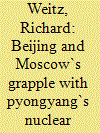

|
|
|
|
|
| Summary/Abstract |
Beijing and Moscow pursue similar goals and policies toward the Democratic People`s Republic of Korea. They want to end North Korea`s nuclear weapons and ballistic missile tests, since these activities spur further proliferation, complicate China`s and Russia`s outreach toward the Republic of Korea, and strengthen the U.S. military presence in Northeast Asia. Yet, Beijing and Moscow oppose military responses or strong sanctions since both parties fear that coercive measures could precipitate regime change in Pyongyang, which alarms them more than a nuclear-armed North Korea. Hence, Beijing and Moscow seek to wean Pyongyang off of its nuclear addiction through foreign assistance and security assurances that promote an international climate favorable toward internal reforms and improvements in North Korea`s external behavior. They argue that dialogue and negotiations leading to the denuclearizing of the Peninsula would best promote the interests of all parties in terms of regional peace and stability. Nonetheless, there are important differences between China`s and Russia`s policies. For example, Beijing has more economic tools to apply against the DPRK, while Moscow seems more open to Korean reunification, under certain conditions, as an enduring solution to the Pyongyang problem.
|
|
|
|
|
|
|
|
|
|
|
|
|
|
|
|
| 12 |
ID:
092912
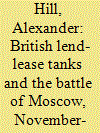

|
|
|
|
|
| Publication |
2009.
|
| Summary/Abstract |
This short article returns to the issue of the value of British Lend-Lease tanks for the Soviet war effort during late 1941 from a research note in Volume 19, Number 2 of this journal.
|
|
|
|
|
|
|
|
|
|
|
|
|
|
|
|
| 13 |
ID:
120557
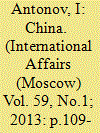

|
|
|
|
|
| Publication |
2013.
|
| Summary/Abstract |
ON NOVEMBER 8-15, 2012, China held the 18th National Congress of the Communist Party of China (CPC) in which a process of generational change in Chinese leadership began.
This time around the preparation and the congress itself occurred in the midst of a rather complex situation. It is impossible not to recall the removal from power (at the year's start) of one of the most popular politicians, the head of the Chongqing municipal Party committee, son of famous revolutionary Bo Yibo - Bo Xilai, who aspired for one of the highest party posts. In addition, a role was played by Western media reports concerning Vice President Xi Jinping and Premier Wen Jiabao's "family riches" that are hard to make without protection from above.
|
|
|
|
|
|
|
|
|
|
|
|
|
|
|
|
| 14 |
ID:
093745
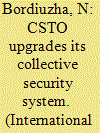

|
|
|
|
|
| Publication |
2009.
|
| Summary/Abstract |
THE COLLECTIVE SECURITY Treaty Organization summit that met on 4 February 2009 in a special session of the Collective Security Council (CSC) decided to set up Collective Rapid-Reaction Forces (CRRF) of the CSTO.
Acting on the fundamental provisions contained in the Collective Security Council's decision this past February, a team of experts of the Organization and of the member states drafted and submitted to the presidents, on 14 June 2009, a number of top-priority documents regulating activities of the CRRF. In particular, the Collective Security Council members examined and signed a framework agreement on Collective Rapid-Reaction Forces of the CSTO and appropriate annexes.
|
|
|
|
|
|
|
|
|
|
|
|
|
|
|
|
| 15 |
ID:
118309
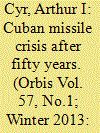

|
|
|
|
|
| Publication |
2013.
|
| Summary/Abstract |
The fiftieth anniversary of the October 1962 Cuban missile crisis is an appropriate time to review the events, which arguably were the closest the world has come to general nuclear war. The crisis was preceded by growing tensions between Moscow and Washington, and increasing Cuba emphasis in U.S. domestic politics. Analysts have differed on motives for trying to place long-range missiles in Cuba; Soviet officials consistently emphasized defense of Cuba. Revelations since the crisis indicate war was even closer than realized at the time. President John F. Kennedy deserves considerable credit for resisting military pressures.
The Cuban Missile Crisis of October 1962 arguably was the closest the world has come to nuclear war since the beginning of the nuclear era in 1945, and for that reason alone has been the focus of notable theatrical and literary products as well as scholarly analysis. The crisis has been described as President John F. Kennedy's "finest hour" in a touchingly brief tenure in the White House, and also as the direct result of weakness and miscalculation in the administration of that same American chief executive. Crisis management, a popular subject for analysis even before the crisis, received a major boost in visibility as a result of this unprecedented confrontation. The colorful personalities involved on both sides, including unpredictable Soviet Premier (Chairman of the Council of Ministers) Nikita Khrushchev, as well the photogenic and public relations-conscious U.S. leader, and some of their immediate advisers, have added to both human interest and dramatic potential. Finally, the crisis led to changes in strategic policies on the part of the United States and the Soviet Union, and their immediate allies. For these reasons and others, the half-century anniversary of the events merit a fresh look, both to review previous analyses and discuss lessons which bear on present-and future-international relations.1
The perceptions and conclusions among informed students of the Cuban Missile Crisis generally have shifted over the decades. At least in the United States, and among the international strategic studies community more generally, the initial reactions were generally laudatory of Kennedy and his men. Nuclear war had been avoided, while the goal of the removal of Soviet missiles from Cuba was achieved. Walt W. Rostow, a member of the Kennedy administration who later became national security adviser to President Lyndon B. Johnson, described the crisis as "the Gettysburg of the Cold War," a characteristic observation from this highly theoretical academic, but one which reflected wider sentiment. Later in the 1970s, as plots involving the U.S. government in efforts to assassinate Fidel Castro came to light, the Kennedy administration was regarded in a more critical light. During the same decade, information became public regarding JFK's reckless behavior in his personal life. That led at least some to analyze policies and politics of his administration with a much more critical perspective.2
|
|
|
|
|
|
|
|
|
|
|
|
|
|
|
|
| 16 |
ID:
114700
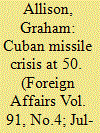

|
|
|
|
|
| Publication |
2012.
|
| Summary/Abstract |
Fifty years ago, the Cuban missile crisis brought the world to the brink of nuclear disaster. During the standoff, U.S. President John F. Kennedy thought the chance of escalation to war was "between 1 in 3 and even," and what we have learned in later decades has done nothing to lengthen those odds. We now know, for example, that in addition to nuclear-armed ballistic missiles, the Soviet Union had deployed 100 tactical nuclear weapons to Cuba, and the local Soviet commander there could have launched these weapons without additional codes or commands from Moscow. The U.S. air strike and invasion that were scheduled for the third week of the confrontation would likely have triggered a nuclear response against American ships and troops, and perhaps even Miami. The resulting war might have led to the deaths of 100 million Americans and over 100 million Russians.
|
|
|
|
|
|
|
|
|
|
|
|
|
|
|
|
| 17 |
ID:
034870
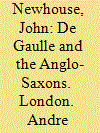

|
|
|
|
|
| Publication |
London, Andre Deutsch, 1970.
|
| Description |
viii, 374p.Hbk
|
| Contents |
Includes index.
|
| Standard Number |
0233961623
|
|
|
|
|
|
|
|
|
|
|
|
Copies: C:1/I:0,R:0,Q:0
Circulation
| Accession# | Call# | Current Location | Status | Policy | Location |
| 005796 | 923.144/NEW 005796 | Main | On Shelf | General | |
|
|
|
|
| 18 |
ID:
118410
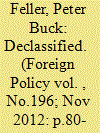

|
|
|
| 19 |
ID:
093746
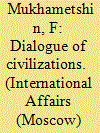

|
|
|
|
|
| Publication |
2009.
|
| Summary/Abstract |
MANY PROMINENT political and academic figures have announced the end of financial globalization as it was before the crisis. The philosophy of globalism itself based on the rapacious use of the planet's resources and complete disregard for the interests and the future of those not included among the "gold billion" has taken a severe blow. The saying goes that nature abhors a vacuum, thus a new paradigm of development of civilization is supposed to come along and replace the failed theory of mono-centric global management of the world.
|
|
|
|
|
|
|
|
|
|
|
|
|
|
|
|
| 20 |
ID:
171135
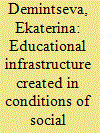

|
|
|
|
|
| Summary/Abstract |
This article demonstrates how social exclusion affects the strategies that migrants and their children experience vis-à-vis the preschool education system of the host society. We use the example of two private institutions established in Moscow by Kyrgyz migrants to explore their role in helping integrate migrant children into the host society. I examine the role the Kyrgyz community plays in the life of labour migrants in Moscow, and why private migrant infrastructure is created today by people from this particular country, though eventually migrants from other countries use it as well. I find that in recent years migrants have been creating private infrastructure in Russia as an alternative to the public one. It replaces state institutions for migrants that are not accessible to them. Migrants also view it as one of the channels for entering the Russian society and state institutions. These centres do not so much help migrants’ children escape social isolation as compensate for the lack of adjustment programmes in Russian schools.
|
|
|
|
|
|
|
|
|
|
|
|
|
|
|
|
|
|
|
|
|